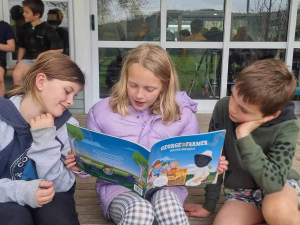Farmer confidence dips slightly, but positivity still dominates
Farmer confidence has taken a slight dip according to the final Rabobank rural confidence survey for the year.
 Over the last nine years more than 100,000 Aussie kids have connected to the earth, food and farm through the adventures of George the Farmer, his agronomist wife, Dr Ruby and their twin children, Lucy and Jack.
Over the last nine years more than 100,000 Aussie kids have connected to the earth, food and farm through the adventures of George the Farmer, his agronomist wife, Dr Ruby and their twin children, Lucy and Jack.
A hundred primary schools across New Zealand are now better resourced to teach their students about food and farming after winning ‘George the Farmer’ book sets in a recent competition run by rural lender, Rabobank.
The competition – which ran in late July and early August – was open to all primary schools across New Zealand and attracted entries from around the country. The winning schools were informed of their success in mid-August and the educational book sets (made up of six ‘George the Farmer’ books) were delivered to the 100 winning schools earlier this month.
Rabobank New Zealand head of client councils Jeffrey Morrison says this year’s competition was the second edition of the competition following its first iteration last year.
“In conjunction with our Client Council network, the bank developed the competition to improve knowledge about farming and food production among young Kiwis,” he says.
“We were rapt with the response to the initial competition – which saw 45 sets of the books given away – and, based on the huge volume of entries we received, it was clear to us that there is strong demand from schools throughout the country for this type of agri-focused teaching resource.
“So, we made the decision to run the competition again and this time around we decided to more than double the amount of book sets we gave away.”
Morrison says as part of the competition entry process, entrants were asked to provide a brief explanation on why their nominated school should receive a set of the books.
“As was the case last year, some of the explanations from schools and parents were incredible and it was really difficult to choose the winners,” he says.
“We’re really happy the competition has proven popular again and that we’ve been able to provide book sets to schools from locations right around New Zealand.”
The ‘George the Farmer’ book set giveaway was one of several Rabobank Client Council initiatives helping to grow and strengthen rural communities.
Council initiatives are linked to six key themes - industry capacity and agri education, environmental sustainability, natural disaster resilience, the rural/ urban connection, rural wellbeing, and adaption disruption.
Morrison says this particular initiative links nicely with its agri education and rural/ urban connection themes.
“We’re hoping this latest book giveaway will help boost young Kiwis’ knowledge of food production.”
Morrison says feedback from the winning schools was now flowing in, including from Midhirst School – a small primary school located 35km south-east of New Plymouth in the Taranaki.
“Midhirst were entered into the competition by school parent Claire Bishop,” he says.
“In her entry, Claire said the books would ‘bring a bit of farming to the classroom’ and ‘help start a conversation about the important role farming plays in bringing kids their milk and Weetbix in the morning’.”
Jennie Molloy from Te Miro School says the books had also proven a hit with Te Miro students.
“The books are wonderful! The children absolutely adore reading the stories, and it's clear from their excitement and engagement how much they appreciate them,” she says.
“The books have become a cherished part of their reading time and brought so much happiness to our little readers.”
About George the Farmer
‘George the Farmer’ is a fictional character featured in a series of books and educational resources.
His story began in 2012 when founder, South Australia-based farmer Simone Kain, was trawling the internet looking for farming books and apps for her farm-obsessed son, George. Simone quickly discovered there wasn't a human farming character globally who was telling sequential stories about life on the land for children.
In 2014, the George the Farmer book and educational resource series was officially born and over the last nine years more than 100,000 Aussie kids have connected to the earth, food and farm through the adventures of George the Farmer, his agronomist wife, Dr Ruby and their twin children, Lucy and Jack.
Tickets are now available for Beef + Lamb New Zealand’s (B+LNZ) Out the Gate, returning from 19-21 May 2026 at Te Pae, Christchurch.
Dairy Women's Network (DWN) is welcoming AgriHealth as a new partner.
Northland Field Days patron Ross Newlove remembers the inaugural field days he attended 40 years ago.
Southland farmer Murray Donald has been appointed as chair of Safer Farms, the industry-led organisation focused on reducing harm, injuries and fatalities in the agricultural sector.
National Lamb Day returns this Sunday, 15 February, with Beef + Lamb New Zealand Inc calling on Kiwis to fire up their barbecues and celebrate the people and the product that put New Zealand on the world map.
When it comes to arranging the sound system at Northland Field Days, no one does it better than Colin Finlayson.

OPINION: Here w go: the election date is set for November 7 and the politicians are out of the gate…
OPINION: ECan data was released a few days ago showing Canterbury farmers have made “giant strides on environmental performance”.